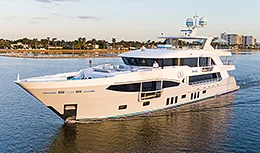- Alaskan Yachts
- Azimut Yachts
- Back Cove Yachts
- Beneteau Yachts
- Benetti Superyachts
- Bertram Yachts
- Boston Whaler
- Broward Yachts
- Buddy Davis Sportfish
- Burger Yachts
- Cabo Yachts
- Catamarans
- Carver Motoryachts
- Center Console
- Chris-Craft Yachts
- Cruisers Yachts
- DeFever Trawlers
- Dufour Sailboats
- Fairline Yachts
- Feadship Yachts
- Ferretti Yachts
- Formula Yachts
- Fountaine Pajot Cats
- Grady-White
- Grand Banks Trawlers
- Hargrave Yachts
- Hatteras Yachts
- Hinckley Picnic Boats
- Horizon Yachts
- Hydra-Sports
- Intrepid Boats
- Jarrett Bay Sportfish
- Jeanneau Yachts
- Kadey-Krogen Trawlers
- Lazzara Yachts
- Lekker Boats
- Luhrs Sportfish
- Marlow Yachts
- Maritimo Yachts
- Marquis Yachts
- McKinna Motoryachts
- Meridian Yachts
- Midnight Express
- MJM Yachts
- Mochi Craft
- Neptunus Motoryachts
- Nordhavn Trawlers
- Nordic Tugs
- Numarine Yachts
- Ocean Alexander Yachts
- Offshore Yachts
- Outer Reef
- Oyster Sailing Yachts
- Pacific Mariner Yachts
- Palmer Johnson Yachts
Finance Your Yacht: Paying “Cash” vs. Financing a Purchase
Discover the benefits of financing versus paying upfront for your new boat purchase.
The purchase of a large asset can be complex. We reached out to the Denison F&I department to discover the benefits of financing a new boat rather than paying in full.
In today’s higher interest rate environment, we are seeing a greater percentage of cash deals taking place. This doesn’t mean that buyers are walking in with bags of physical dollars, but that they are using an alternative way to finance their purchase. Sources of these funds typically come from places such as checking or savings accounts, home equity lines of credit, the sale of securities or other assets, or they pull the funds from a family business or trust.
While on the surface, it may seem that these strategies are eliminating the interest expense, there are a number of other hidden costs which can offset any savings they may gain. We realize that people have savings specifically to make these purchases. However, there are things that can be done to maximize their purchase. Let’s take a look at each of these scenarios.

Savings Accounts: Taking cash from a checking or savings account is justifiable for a down payment or to fully fund a smaller purchase. However, there are substantial opportunity costs to consider on larger purchases with this strategy. Currently, we are in an environment where traditional investment vehicles are not performing well, which makes holding those funds as cash or utilizing them seem more beneficial in the short term. As that scenario changes and investment returns normalize, having those funds available to reinvest will be much more desirable.
Home Equity Line of Credit (HELOC): Putting your personal residence at risk to buy a boat is never advisable. No one makes a purchase with the intent that they will not be able to pay for it. However, there are always unforeseen health issues or changes in the economy that are outside of one’s personal control. Yes, you may be able to sell the boat and pay off the HELOC. What happens if the economy goes south and it takes six months to find a buyer? It may be too late by then. Using a boat loan in this case confines the risk to the boat itself which makes much more sense–especially when you see that marine financing rates are comparable to HELOCs and offer fixed-rate options.
Sale of Securities or Other Assets: Almost all sales of securities or other assets held for investment involve the payment of capital gains taxes when they are sold. The typical buyer falls into the 20% tax bracket for assets held more than a year and would be taxed at their regular income tax bracket for those held less than a year. Depending on one’s personal financial situation, it may make sense to stagger those withdrawals over multiple tax years. Since most boat loans have no prepayment penalties, they can be utilized to bridge that timeline and minimize the possible effect of taxes.
Business Funds: Self-employed people hold money in their businesses for a number of reasons. The two main purposes are taxes or to fund normal operations of the business as needed. Both of those reasons can be complicated by using business funds to make a personal boat purchase. The withdrawal may make it taxable to the owner as regular income and it may decrease the ability of the business to fund inventory or payroll in an emergency.
Today, banks offer a variety of marine loans which can be tailored to your specific situation and needs. Call us today and see how we can help!
YACHT FINANCING & BOAT LOANS

Denison Financial Services offers an expert, in-house team specializing in Finance and Insurance. With over 30 years of experience, our finance team’s long-standing relationships with the best lenders can provide you the most competitive rates and flexible financing options.
For more information about financing your yacht or understanding current interest rates, email the finance team at Finance@DenisonYachting.com. To start your search in purchasing a new yacht, speak to a Denison yacht broker today.






